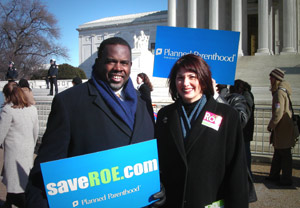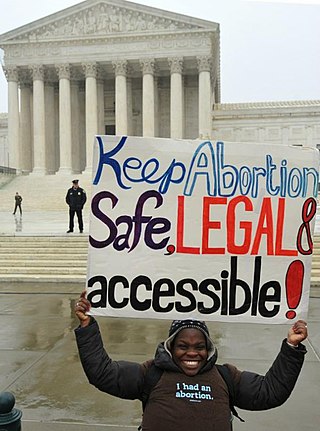Related Research Articles
The United Methodist Church (UMC) is a worldwide mainline Protestant denomination based in the United States, and a major part of Methodism. In the 19th century, its main predecessor, the Methodist Episcopal Church, was a leader in evangelicalism. The present denomination was founded in 1968 in Dallas, Texas, by union of the Methodist Church and the Evangelical United Brethren Church. The UMC traces its roots back to the revival movement of John and Charles Wesley in England, as well as the Great Awakening in the United States. As such, the church's theological orientation is decidedly Wesleyan. It embraces liturgical worship, holiness, and evangelical elements.

The United States abortion-rights movement is a sociopolitical movement in the United States supporting the view that a woman should have the legal right to an elective abortion, meaning the right to terminate her pregnancy, and is part of a broader global abortion-rights movement. The movement consists of a variety of organizations, with no single centralized decision-making body.
Reproductive Freedom for All, formerly NARAL Pro-Choice America and commonly known as simply NARAL, is a non-profit 501(c)(4) organization in the United States that engages in lobbying, political action, and advocacy efforts to oppose restrictions on abortion, to expand access to abortion and birth control, and to support paid parental leave and protection against pregnancy discrimination.

The Alliance for Justice (AFJ) is a progressive judicial advocacy group in the United States. Founded in 1979 by former president Nan Aron, AFJ monitors federal judicial appointments. AFJ represents a coalition of 100 politically leftist groups that have an interest in the federal judiciary. The Alliance for Justice presents a modern liberal viewpoint on legal issues.
The Methodist Federation for Social Action (MFSA) is an independent network of United Methodist clergy and laity working for justice in the areas of peace, poverty, and people's rights since 1907.
The Religious Coalition for Reproductive Choice (RCRC) is an abortion rights organization founded in 1973 by clergy and lay leaders from mainline denominations and faith traditions to create an interfaith organization following Roe v. Wade, the 1973 U.S. Supreme Court decision legalizing abortion in the U.S. In 1993, the original name – the Religious Coalition for Abortion Rights (RCAR) – was changed to the Religious Coalition for Reproductive Choice.

The General Board of Church and Society (GBCS) is a general agency of the United Methodist Church. It is one of four international general program boards of The United Methodist Church as set out the UMC Book of Discipline. The General Board has headquarters on Capitol Hill in Washington, D.C., and at the Interchurch Center in New York City. There are five divisions within the GBCS: Public Witness and Advocacy, Administration, Ministry of Resourcing Congregational Life, United Nations Ministry and Communications.

Catholics for Choice (CFC) is a dissenting Catholic group that advocates for abortion rights which is based in Washington, D.C. Formed in 1973 as Catholics for a Free Choice, the group gained notice after its 1984 advertisement in The New York Times challenging Church teaching on abortion led to Church disciplinary pressure against some of the priests and nuns who signed it. It has lobbied nationally and internationally for abortion rights goals and led an unsuccessful effort to downgrade the Holy See's status in the United Nations. CFC was led for 25 years by Frances Kissling and is currently led by its President Jamie L. Manson.

The Reconciling Ministries Network (RMN) is an organization seeking the inclusion of people of all sexual orientations and gender identities in both the policy and practices of United Methodist Church. It is one of many Welcoming Congregation organizations to emerge in American Christianity in the 1980s. The ministry has over 1100 affiliated congregations and 42,000 affiliated individuals.
Leo A. Soriano is a retired bishop of the United Methodist Church (U.M.) in the Philippines. He was elected in 2000 and held this position until 2012.
The Leadership Conference on Civil and Human Rights, formerly called the Leadership Conference on Civil Rights, is an umbrella group of American civil rights interest groups.
Methodist viewpoints concerning homosexuality are diverse because there is no one denomination which represents all Methodists. The World Methodist Council, which represents most Methodist denominations, has no official statements regarding sexuality. British Methodism holds a variety of views, and permits ministers to bless same-gender marriages. United Methodism, which covers the United States, the Philippines, parts of Africa, and parts of Europe, concentrates on the position that the same-sex relations are incompatible with "Christian teaching", but extends ministry to persons of a homosexual orientation, holding that all individuals are of sacred worth.

Reproductive justice is a critical feminist framework that was invented as a response to United States reproductive politics. The three core values of reproductive justice are the right to have a child, the right to not have a child, and the right to parent a child or children in safe and healthy environments. The framework moves women's reproductive rights past a legal and political debate to incorporate the economic, social, and health factors that impact women's reproductive choices and decision-making ability.

Christianity and abortion have a long and complex history. There is a general consensus that the texts of the Bible are "ambiguous" on the subject of abortion, neither containing explicit support or opposition, although there has been several passages that have been interpreted indicating both. Today, Christian denominations hold widely variant stances.

Minerva Garza Carcaño is the first Hispanic woman to be elected to the episcopacy of The United Methodist Church (UMC), the second-largest Protestant denomination in the United States. She was elected in 2004. Her first assignment was as Bishop of the Phoenix Episcopal Area of Desert Southwest Conference of the UMC. She was then appointed as Bishop of the California-Pacific Annual Conference of the UMC in 2012, and currently serves as Bishop of the California-Nevada Annual Conference of the UMC. She also serves as the leader of the United Methodist Church's Immigration Task Force.

Founded in 1987, Lifewatch, Taskforce of United Methodists on Abortion and Sexuality (TUMAS) is a 501(c)(3) organization that serves as the unofficial anti-abortion group within the United Methodist Church (UMC). The organization publishes a quarterly newsletter titled Lifewatch and is a member of the National Pro-Life Religious Council. The organization also frequently holds seminars to address within Methodist Christianity the theological, moral, and social aspects of defending women and their unborn children from abortion. It is committed to reversing the Roe v. Wade decision "by first providing theological leadership within the church, which will set an example that political, legal and cultural forces will follow."
The Global Methodist Church is a Methodist denomination of Protestant Christianity subscribing to views consistent with the conservative Confessing Movement. The denomination is headquartered in the United States and has a presence internationally. The Global Methodist Church was created as a result of a schism with the United Methodist Church, after members departed to erect a denomination seeking to uphold "theological and ethical Christian orthodoxy." Congregations that left the UMC to form the Global Methodist Church opposed recognition of same-sex marriage and the ordination of non-celibate gay clergy. Its doctrines, which are aligned with Wesleyan-Arminian theology, are contained in the Transitional Book of Doctrines and Discipline, its Book of Discipline, and in The Catechism of the Global Methodist Church. As of 2023, the church says it is composed of nearly 3,000 congregations and over 3,200 clergy members.
References
- ↑ "United Women in Faith". United Women in Faith. Retrieved 2022-07-10.
- ↑ "United Women in Faith | Our History". United Women in Faith. 2022.
- ↑ "What We do".
- ↑ "Serve & Advocate". United Women in Faith. Retrieved 2022-07-10.
- ↑ "Church tackles difficult subject of abortion". The United Methodist Church. Retrieved 2016-05-30.
- ↑ "UMC withdraws from interfaith pro-abortion rights group". Religion News Service. 21 May 2016. Retrieved 2016-05-30.
- ↑ "What is the UM position on abortion?". www.umc.org.